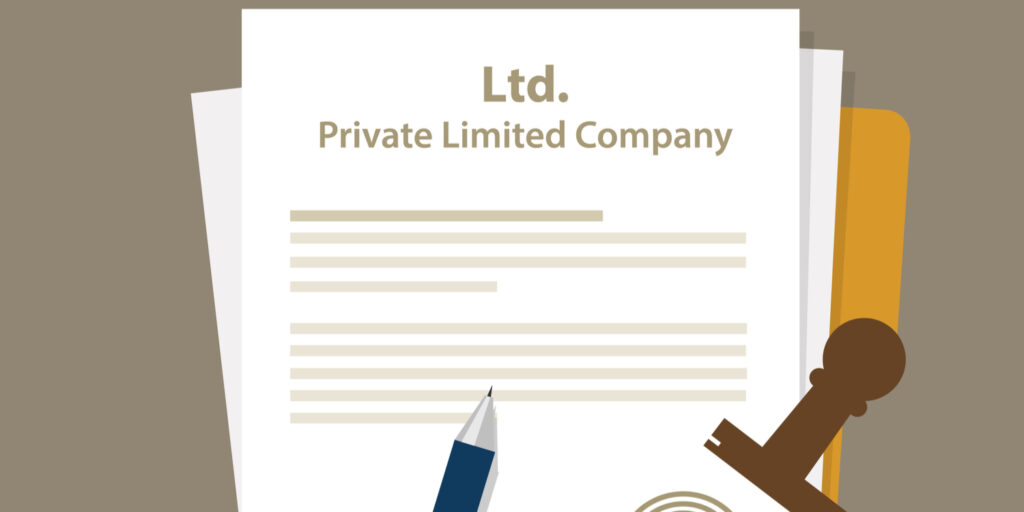If you’re thinking about forming a company, you need to know about the different structures available to you. Whether you’re starting your first venture or planning to expand, understanding the structure, benefits, and obligations of a private limited company can help you make informed decisions about your business’s future.
In this blog, we’ll explain what a private limited company is and the pros and cons of forming one. Let’s get started.
Key Takeaways
- A private limited company is privately owned and exists as a separate legal entity from its owners.
- Private limited companies are the most common company structure in the UK.
- The benefits include limited liability protection and tax efficiency, and potential drawbacks include ongoing legal and financial reporting requirements.
What is a private limited company?
A private limited company is a separate legal entity operating distinctly from its owners, who are called the members. In other words, the company and its owners are two different people.
Private limited companies are by far the most common type of company structure in the UK. They can range from a single-person operation with no employees to massive companies with multimillion-pound turnovers.
In the UK, you can form a private limited company that is either limited by shares or limited by guarantee. So, if you have a great business idea, a private limited company might just be the right choice for you.
Companies limited by shares vs limited by guarantee
Private limited companies can be categorised as either limited by shares or limited by guarantee. Both structures share very similar characteristics, except for how they are owned.
Both structure types are owned by their members. The members of a private company limited by shares are its shareholders, whilst the members of a private company limited by guarantee are its guarantors (who agree to guarantee a certain amount of the company’s debt).
Generally speaking, limited by shares companies are for-profit and limited by guarantees are for non-profit ventures. As both structures are under the umbrella of private limited companies, they provide the owners with limited liability.
What does ‘limited’ mean in a private limited company?
The term ‘limited’ refers to the members’ liability. In other words, the total amount of money owners will owe if the company ever requires it.
When you set up your private company limited by shares, you will decide how many shares each shareholder will have and the nominal value of each of these shares. The shareholders are then only liable up to the total issue price of these shares (which is usually just the nominal value). Many companies owned by one person will decide that the owner will hold only one share with a nominal value of £1, keeping their liability low at just £1.
- How to change from sole trader to limited company
- Companies limited by guarantee or shares – what’s the difference?
- Limited liability: what does this mean for you and your company?
Similarly, in a private company limited by guarantee, each member agrees to guarantee a certain amount of the company’s debt. This is usually a nominal amount of £1, so the owners’ liability is kept low.
In contrast, a sole trader has unlimited liability, meaning creditors can pursue you directly.
Advantages of a private limited company
Whilst many people still operate as a sole trader, it may be worth considering a limited company for the advantages that it can offer, such as:
- Simple set-up – the company formation process is quick, with companies often formed in a matter of hours.
- Limited liability for the owners – your personal assets are generally not at risk, as the company is responsible for its own debts.
- Tax efficiency – Private limited companies don’t pay income tax like sole traders. Instead, their profits are subject to corporation tax. Directors and shareholders then have flexible ways of paying themselves (e.g. directors’ salary, dividends), allowing you to choose the most tax-efficient solution.
- Improves professional image – a business with a corporate identity gives the perception of a much larger and more credible operation.
- Allows for succession – As individual entities, private limited companies legally exist unless formally dissolved. This means they can have an infinite lifespan, allowing you to pass ownership to others.
- Protection of your company name – Every registered company name is unique. Once you’ve formed a private limited company, no other business can copy or use your company name.
- Better access to funding – You can bring private investors on board, and lenders could find your business more trustworthy, making it easier to secure loans and other financial support.
Disadvantages of a private limited company
It’s crucial to familiarise yourself with the pros and cons of a private limited company before making an informed decision. Here are some of the potential drawbacks to consider:
- Legal compliance – Registered companies are subject to strict regulatory compliance. This involves reporting certain company information to Companies House and HMRC, registering for and managing payroll (when you take on employees), and submitting tax returns. Every reporting requirement has a deadline, which, if you miss it, could lead to a financial penalty or even director disqualification.
- Financial complexity – Taking money out of a private limited company isn’t easy. There are formal ways to transfer money to and from the business, and every transaction must be clearly reported. For directors and shareholders, this can make it complicated to get paid.
Final words
Starting a private limited company is an exciting but big decision to make. There’s a lot to consider; while it might be tax-efficient, there’s an ongoing administrative burden, and while it protects your company name, paying yourself can be complicated. It’s certainly a decision you need to weigh up from both sides and determine if it’s the right choice for you.
If you’re ready to take the next step, we can help you set up your private limited company. Simply choose your ideal formation package, tell us about your company, and we’ll do the rest. Once Companies House approves your application, we’ll email you all your incorporation documents.
We’ll also be there to guide you throughout your company’s lifetime. Whether you need business advice, help with staying compliant, or simply want to ask a question, we offer plenty of useful resources to make running a company as easy as possible.
We hope you found this blog post helpful. If you have any questions about private limited companies or company formations in general, please comment below or call our Customer Support Team on 020 3897 2233.
Please note that the information provided in this article is for general informational purposes only and does not constitute legal, tax, or professional advice. While our aim is that the content is accurate and up to date, it should not be relied upon as a substitute for tailored advice from qualified professionals. We strongly recommend that you seek independent legal and tax advice specific to your circumstances before acting on any information contained in this article. We accept no responsibility or liability for any loss or damage that may result from your reliance on the information provided in this article. Use of the information contained in this article is entirely at your own risk.










Join The Discussion
Comments (2)
Great article, Laura – a succinct and compelling case for private limited companies as a vehicle for operating a business. Thank you!
We’re glad you liked it Nick – thanks for the feedback!
Regards,
The 1st Formations Team